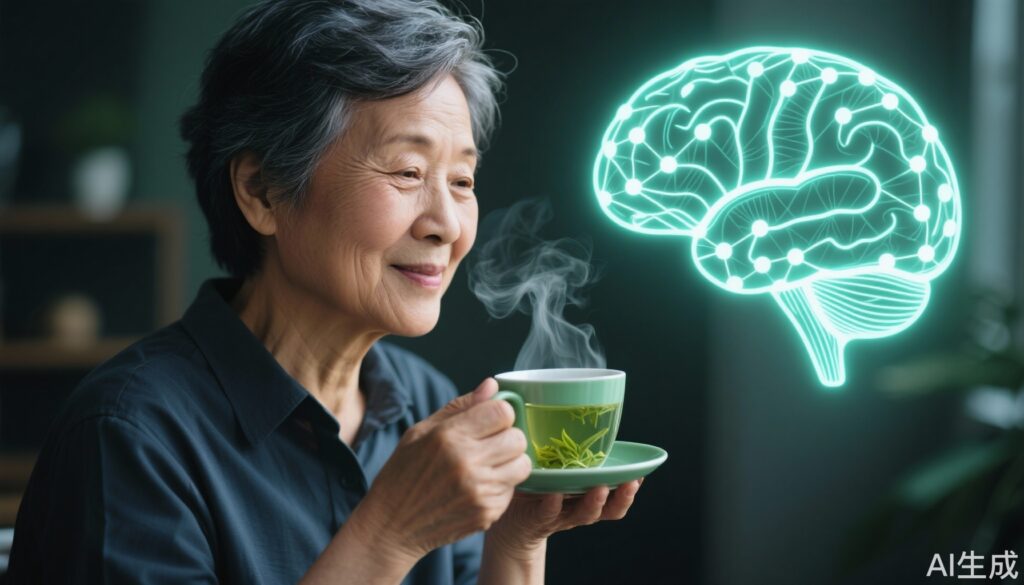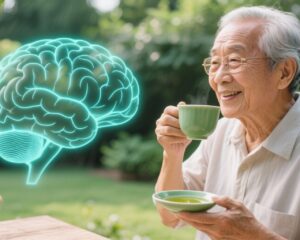Introduction
A common ritual enjoyed around the world, a warm cup of green tea is often associated with feelings of alertness and mental clarity. But beyond these anecdotal experiences, does green tea truly have a scientifically proven effect on brain function? Recent research sheds light on this question, revealing promising evidence that processed green tea products, specifically heat-treated green tea extract (HT-GTE), may enhance memory and brain connectivity in individuals concerned about their cognitive performance.
Background: Addressing Subjective Memory Impairment
Subjective Memory Impairment (SMI) describes a state where individuals perceive noticeable memory difficulties despite performing normally on objective cognitive tests. Often observed in middle-aged adults, SMI can be an early warning sign for future cognitive decline and an unmet medical challenge in preventive neurology. Interventions that safely improve cognitive function at this stage are highly sought after to possibly maintain quality of life and delay progression to mild cognitive impairment or dementia.
Green tea is rich in bioactive compounds like catechins and theanine, long considered neuroprotective. However, the cognitive benefits of processed green tea products have remained insufficiently explored under rigorous clinical conditions.
Scientific and Clinical Evidence: The 12-Week HT-GTE Trial
In a landmark study published in the Journal of Medical Food (Joo et al., 2025), researchers conducted a randomized, double-blinded, placebo-controlled trial involving 80 middle-aged adults with SMI (average age 49.6 years).
Participants were allocated to receive either HT-GTE supplements or placebo daily for 12 weeks. Memory function was evaluated using standardized composite cognitive scores at the study’s start and after 12 weeks. Additionally, brain connectivity changes were monitored using functional magnetic resonance imaging (fMRI), focusing on the default mode network (DMN) — a brain network crucial for memory and self-referential thought processes.
Key Findings
– The HT-GTE group showed statistically significant improvement in memory composite scores compared to the placebo group (z = 2.535, P = .011).
– Functional connectivity within the right precuneus region of the DMN was enhanced in HT-GTE group participants (z = 2.554, P = .011).
These results suggest that HT-GTE supplementation not only improves subjective memory but also positively modulates the brain’s functional architecture involved in cognition.
Understanding the Default Mode Network and Memory
The default mode network (DMN) consists of interconnected brain regions active during rest and involved in processing memories and internal thoughts. Alterations in DMN connectivity often correlate with cognitive impairments in aging and neurodegenerative diseases.
The observed increased connectivity in the right precuneus—a key DMN node—indicates more efficient communication within brain circuits responsible for memory, potentially explaining improved cognitive performance in HT-GTE consumers.
Common Misconceptions About Green Tea and Cognition
Despite its popularity, misconceptions persist:
– Green tea is just a stimulant: While caffeine in green tea does provide short-term alertness, its cognitive benefits extend beyond stimulatory effects thanks to bioactive compounds.
– All green teas are the same: The processing method, such as heat treatment, significantly affects the concentration and activity of beneficial compounds.
– Instant mental boosts equal long-term benefits: Cognitive improvement from HT-GTE supplementation develops over weeks and involves brain connectivity changes, not just immediate alertness.
Correct Health Practices: Incorporating Green Tea Into Cognitive Wellness
To harness the cognitive benefits of green tea, consider the following:
– Opt for quality, processed products: Heat-treated green tea extracts have been clinically validated for memory benefits, unlike unprocessed or generic teas.
– Consistency matters: Cognitive effects were observed after 12 weeks of daily supplementation.
– Complement with lifestyle measures: Balanced diet, physical exercise, and cognitive engagement enhance and sustain brain health.
Expert Insights
Dr. Sung-Woo Yoon, lead author of the study, emphasized, “Our findings support that HT-GTE is a promising nootropic agent for middle-aged individuals experiencing subjective memory difficulties. The increase in functional connectivity within the default mode network suggests that green tea’s benefits are rooted in measurable brain function improvements.”
Neurologists highlight the potential of integrating such natural supplements in preventive strategies but caution about the need for larger long-term studies to define optimal dosages and populations.
Patient Scenario: John’s Journey to Improved Memory
John, a 51-year-old accountant, noticed daily forgetfulness affecting his work and social life. Despite normal clinical tests, his concern mirrored subjective memory impairment. After starting daily HT-GTE supplementation as part of a clinical trial, John reported clearer thinking and better recall after three months. Imaging tests confirmed improved brain connectivity, boosting his confidence in a simple, natural approach to cognitive health.
Conclusion
This pioneering research offers compelling evidence that heat-treated green tea extract supplementation can improve memory performance and strengthen key brain networks in middle-aged adults with subjective memory concerns. These findings open avenues for safe, accessible, non-pharmaceutical interventions for cognitive health maintenance.
Further research should explore long-term effects, optimal dosing, and integration with other lifestyle interventions. For individuals experiencing early memory worries, a daily cup of scientifically processed green tea might indeed refresh both mind and brain.
References
Joo Y, Lee H, Jeong H, Suh C, Hong H, Kim Y, Yu S, Lee C, Shim Y, Yoon S. Effects of Heat-Treated Green Tea Extract on Memory Function and Default Mode Network Connectivity in Individuals with Subjective Memory Impairment: A Randomized, Double-Blinded, Placebo-Controlled Trial. J Med Food. 2025 Jul;28(7):708-718. doi: 10.1089/jmf.2024.k.0260. Epub 2025 Apr 24. PMID: 40272820.



